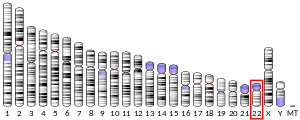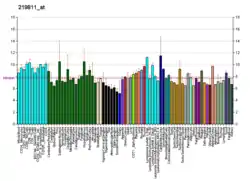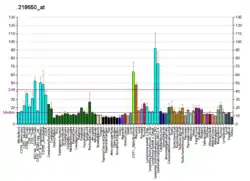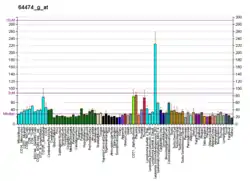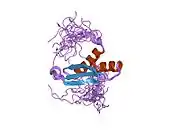| DGCR8 | |||||||||||||||||||||||||||||||||||||||||||||||||||
|---|---|---|---|---|---|---|---|---|---|---|---|---|---|---|---|---|---|---|---|---|---|---|---|---|---|---|---|---|---|---|---|---|---|---|---|---|---|---|---|---|---|---|---|---|---|---|---|---|---|---|---|
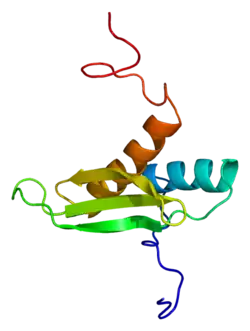 | |||||||||||||||||||||||||||||||||||||||||||||||||||
| |||||||||||||||||||||||||||||||||||||||||||||||||||
| Identifiers | |||||||||||||||||||||||||||||||||||||||||||||||||||
| Aliases | DGCR8, C22orf12, DGCRK6, Gy1, pasha, Pasha, DGCR8 microprocessor complex subunit, microprocessor complex subunit | ||||||||||||||||||||||||||||||||||||||||||||||||||
| External IDs | OMIM: 609030 MGI: 2151114 HomoloGene: 11223 GeneCards: DGCR8 | ||||||||||||||||||||||||||||||||||||||||||||||||||
| |||||||||||||||||||||||||||||||||||||||||||||||||||
| |||||||||||||||||||||||||||||||||||||||||||||||||||
| |||||||||||||||||||||||||||||||||||||||||||||||||||
| |||||||||||||||||||||||||||||||||||||||||||||||||||
| Wikidata | |||||||||||||||||||||||||||||||||||||||||||||||||||
| |||||||||||||||||||||||||||||||||||||||||||||||||||
The microprocessor complex subunit DGCR8 (DiGeorge syndrome critical region 8) is a protein that in humans is encoded by the DGCR8 gene.[4] In other animals, particularly the common model organisms Drosophila melanogaster and Caenorhabditis elegans, the protein is known as Pasha (partner of Drosha).[5] It is a required component of the RNA interference pathway.
Function
The subunit DGCR8 is localized to the cell nucleus and is required for microRNA (miRNA) processing. It binds to the other subunit Drosha, an RNase III enzyme, to form the microprocessor complex that cleaves a primary transcript known as pri-miRNA to a characteristic stem-loop structure known as a pre-miRNA, which is then further processed to miRNA fragments by the enzyme Dicer. DGCR8 contains an RNA-binding domain and is thought to bind pri-miRNA to stabilize it for processing by Drosha.[6]
DGCR8 is also required for some types of DNA repair. Removal of UV-induced DNA photoproducts, during transcription coupled nucleotide excision repair (TC-NER), depends on JNK phosphorylation of DGCR8 on serine 153.[7] While DGCR8 is known to function in microRNA biogenesis, this activity is not required for DGCR8-dependent removal of UV-induced photoproducts.[7] Nucleotide excision repair is also needed for repair of oxidative DNA damage due to hydrogen peroxide (H2O2), and DGCR8 depleted cells are sensitive to H2O2.[7]
References
- 1 2 3 GRCh38: Ensembl release 89: ENSG00000128191 - Ensembl, May 2017
- ↑ "Human PubMed Reference:". National Center for Biotechnology Information, U.S. National Library of Medicine.
- ↑ "Mouse PubMed Reference:". National Center for Biotechnology Information, U.S. National Library of Medicine.
- ↑ "Entrez Gene: DGCR8 DiGeorge syndrome critical region gene 8".
- ↑ Denli AM, Tops BB, Plasterk RH, Ketting RF, Hannon GJ (Nov 2004). "Processing of primary microRNAs by the Microprocessor complex". Nature. 432 (7014): 231–5. Bibcode:2004Natur.432..231D. doi:10.1038/nature03049. PMID 15531879. S2CID 4425505.
- ↑ Yeom KH, Lee Y, Han J, Suh MR, Kim VN (2006). "Characterization of DGCR8/Pasha, the essential cofactor for Drosha in primary miRNA processing". Nucleic Acids Research. 34 (16): 4622–9. doi:10.1093/nar/gkl458. PMC 1636349. PMID 16963499.
- 1 2 3 Calses PC, Dhillon KK, Tucker N, Chi Y, Huang JW, Kawasumi M, Nghiem P, Wang Y, Clurman BE, Jacquemont C, Gafken PR, Sugasawa K, Saijo M, Taniguchi T (2017). "DGCR8 Mediates Repair of UV-Induced DNA Damage Independently of RNA Processing". Cell Rep. 19 (1): 162–174. doi:10.1016/j.celrep.2017.03.021. PMC 5423785. PMID 28380355.
Further reading
- Simpson JC, Wellenreuther R, Poustka A, Pepperkok R, Wiemann S (Sep 2000). "Systematic subcellular localization of novel proteins identified by large-scale cDNA sequencing". EMBO Reports. 1 (3): 287–92. doi:10.1093/embo-reports/kvd058. PMC 1083732. PMID 11256614.
- Shiohama A, Sasaki T, Noda S, Minoshima S, Shimizu N (Apr 2003). "Molecular cloning and expression analysis of a novel gene DGCR8 located in the DiGeorge syndrome chromosomal region". Biochemical and Biophysical Research Communications. 304 (1): 184–90. doi:10.1016/S0006-291X(03)00554-0. PMID 12705904.
- Gregory RI, Yan KP, Amuthan G, Chendrimada T, Doratotaj B, Cooch N, Shiekhattar R (Nov 2004). "The Microprocessor complex mediates the genesis of microRNAs". Nature. 432 (7014): 235–40. Bibcode:2004Natur.432..235G. doi:10.1038/nature03120. PMID 15531877. S2CID 4389261.
- Han J, Lee Y, Yeom KH, Kim YK, Jin H, Kim VN (Dec 2004). "The Drosha-DGCR8 complex in primary microRNA processing". Genes & Development. 18 (24): 3016–27. doi:10.1101/gad.1262504. PMC 535913. PMID 15574589.
- Landthaler M, Yalcin A, Tuschl T (Dec 2004). "The human DiGeorge syndrome critical region gene 8 and Its D. melanogaster homolog are required for miRNA biogenesis". Current Biology. 14 (23): 2162–7. doi:10.1016/j.cub.2004.11.001. hdl:11858/00-001M-0000-0012-EB83-3. PMID 15589161. S2CID 13266269.
- Han J, Lee Y, Yeom KH, Nam JW, Heo I, Rhee JK, Sohn SY, Cho Y, Zhang BT, Kim VN (Jun 2006). "Molecular basis for the recognition of primary microRNAs by the Drosha-DGCR8 complex". Cell. 125 (5): 887–901. doi:10.1016/j.cell.2006.03.043. PMID 16751099.
- Faller M, Matsunaga M, Yin S, Loo JA, Guo F (Jan 2007). "Heme is involved in microRNA processing". Nature Structural & Molecular Biology. 14 (1): 23–9. doi:10.1038/nsmb1182. PMID 17159994. S2CID 17463646.
- Sohn SY, Bae WJ, Kim JJ, Yeom KH, Kim VN, Cho Y (Sep 2007). "Crystal structure of human DGCR8 core". Nature Structural & Molecular Biology. 14 (9): 847–53. doi:10.1038/nsmb1294. PMID 17704815. S2CID 18561478.
